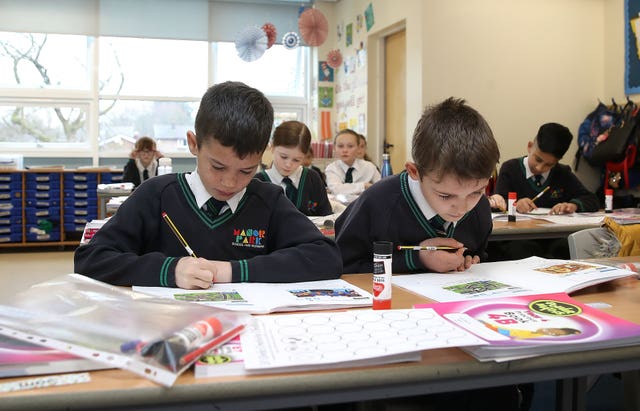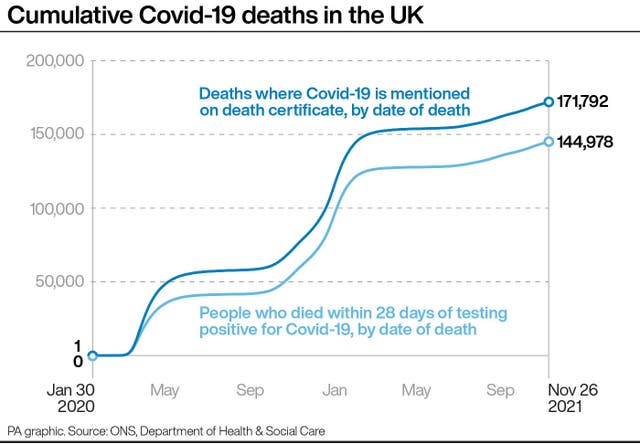Nearly all children have fallen behind with education amid pandemic – Ofsted
Disrupted routine and fewer activities led to physical and mental health problems for many children, chief inspector warns.

Nearly all children in England have fallen behind in their education and suffered as a result of the Covid-19 pandemic, Ofsted has warned.
The watchdog has called on schools to offer pupils sport and extra-curricular activities to ensure children “regain a sense of normality” in their lives.
Chief inspector Amanda Spielman warned that many of the youngest children’s progress and development “faltered” amid the pandemic, with some regressing in basic language and social skills.
Loneliness, boredom and misery became “endemic” among the young – and the loss of education, disrupted routine and fewer activities led to physical and mental health problems for many children, she said.
The younger generation should not be “denied” its chance to enjoy childhood and fulfil its potential in the year ahead, Ms Spielman has urged.
Her comments come after the latest Department for Education (DfE) figures show that the number of children and staff off school for Covid-related reasons in England has risen in recent weeks.
Education unions have warned that disruption to schooling is likely to worsen following the emergence of the newly-identified Omicron coronavirus variant.
Speaking at the launch of Ofsted’s annual report, Ms Spielman said: “A new variant inevitably creates some uncertainty, some anxiety. It’s a concern.”
She added: “We do need to avoid any further disruption to children’s education when they’ve already sacrificed so much as far as we possibly can.”
When asked about the disruption in schools this term, the Ofsted chief inspector said on Tuesday: “I’m quite sure that any teacher would close a school or cancel Christmas events and nativities with a very heavy heart.

“But I will say that children have just lost out on so much over the last 20 months that as far as possible we want them to enjoy the experience and routines of school life as much as they can in the current climate.”
The watchdog’s report assesses education and children’s social care over the 2020-21 academic year.
During this period much of Ofsted’s routine inspection work was suspended – but the inspectorate undertook monitoring visits to see how schools, colleges, nurseries, and social care providers responded to the pandemic.
Ofsted found that, despite the best efforts of many thousands of parents, teachers, social workers and carers, the challenges of the pandemic were so great that “nearly all children fell behind in their education.”
Speaking at the launch on Tuesday, Ms Spielman said: “The lower achievers are the ones who’ve learned least through periods of remote learning and closed schools.
“So it’s very important that we stay very clearly focused on the ones who will need help and who won’t simply recover through schools doing what they always do so well.”

In the report, the Ofsted boss added: “In primary and secondary schools, children struggled with a hokey-cokey education: in the classroom, at home, separated in bubbles, isolating alone.
“Further education (FE) students and apprentices saw their classroom doors closed, their placements curtailed and their job prospects limited.
“And prisoners seeking a second chance through education were unable to leave their cells to learn.”
Children with special education needs or disabilities (SEND) were unable to access the local support services they rely on, while many vulnerable children “disappeared” from teachers’ line of sight, the report said.
Ms Spielman said: “The education and social care sectors have been under tremendous strain since the pandemic began, and their staff have worked tirelessly in children’s interests.
“Their efforts deserve the highest praise. But the challenges of Covid-19 were so great that nearly every child has felt the impact of the resulting restrictions.
“Many young children’s progress and development faltered.”
She added: “In order to protect older generations, we asked the youngest generation to put their lives and education on hold. As we look forward to the year ahead, we must strive to redress the balance.”
In its annual report, Ofsted also raised concerns about children in care feeling less safe due to lockdown restrictions and broken relationships with staff.
“In the worst cases, increased levels of anxiety led to self-harm or destructive behaviour,” it added.
Leaders told inspectors that some children in alternative provision (AP) settings had become more involved in criminal exploitation, including gang violence, and child sexual exploitation amid the pandemic.
The watchdog is calling for the support for the most vulnerable children and those with SEND to rapidly return to pre-Covid levels.
In her commentary in the annual report, Ms Spielman added: “Where some children need a little extra help, they should get it. And children who need specialist care and support must not be left wanting.
“Every generation gets one chance to enjoy its childhood and fulfil its potential. We must do all we can to make sure this generation is not denied its opportunity.”





